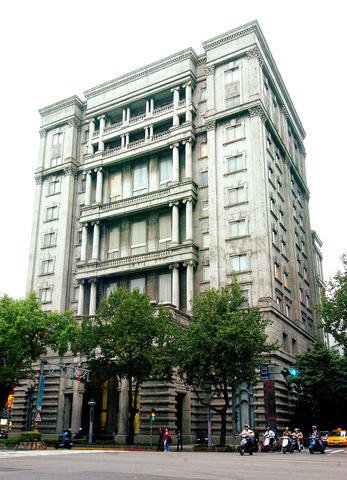Taiwan Life Insurance Co (
Taiwan Life has been looking for a new office as its headquarters on Xuchang Street (
Shares of Taiwan Life slid NT$1.1, or 1.8 percent, to close at NT$60 on the Taiwan Stock Exchange yesterday. The bidding results were announced after the stock market closed.

PHOTO: WANG MIN-WEI, TAIPEI TIMES
Built in 1988, the 13-story Kuo Hua building on Zhongshan N Road, Section 2, has a total floor space of 22,000m2.
Unlike other bidders which planned to construct a new building on the site, Taiwan Life will keep the Baroque building intact, the statement said.
With its good location and potential value increase, the Kuo Hua building attracted the attention of 36 companies, including local and overseas insurers, property developers, private equity funds and hoteliers, said real estate consultancy firm DTZ Debenham Tie Leung, which held the bidding.
Companies that joined the bidding included Taiwan Life, Farglory Group (
The commercial real estate market in Taiwan, with an estimated value of NT$100 billion, will continue to boom in the next two to three years, DTZ Debenham Tie Leung said in a separate release.
Properties on Zhongshan N Road, in particular, have become a magnet to property developers.
Farglory bought the Fortuna Hotel (
Separately, Taiwan Life said that the indictment of its chairman, Chu Ping-yu (朱炳昱), on Tuesday on allegations of insider trading would not affect company operations.
The Taichung District Prosecutors' Office alleged that Chu pocketed NT$16 million from illegal trading of more than 8 million shares of Glotech Inc (
The company said the share purchase was made based on professional evaluation, adding that it would further comment on the issue after receiving the statement of charges.
Taiwan Life posted NT$5.22 billion in sales last month, up 3.4 percent from a year earlier. For the first nine months of the year, revenues grew 37.5 percent year-on-year to NT$53.4 billion, the company reported last week.
In related news, the Financial Supervisory Commission said yesterday it had approved China Life Insurance Co's (中國人壽) plan to acquire Swiss insurer Winterthur Life's Taiwan branch for NT$400 million.
China Life, the nation's ninth-largest life insurer by premium income, announced the acquisition in July to sharpen its competitiveness and boost profitability.
With the acquisition, the number of foreign life insurers in the country was reduced to eight, the commission said in a statement.
Taiwan has a total of 30 local and foreign life insurers, it said.

IN THE AIR: While most companies said they were committed to North American operations, some added that production and costs would depend on the outcome of a US trade probe Leading local contract electronics makers Wistron Corp (緯創), Quanta Computer Inc (廣達), Inventec Corp (英業達) and Compal Electronics Inc (仁寶) are to maintain their North American expansion plans, despite Washington’s 20 percent tariff on Taiwanese goods. Wistron said it has long maintained a presence in the US, while distributing production across Taiwan, North America, Southeast Asia and Europe. The company is in talks with customers to align capacity with their site preferences, a company official told the Taipei Times by telephone on Friday. The company is still in talks with clients over who would bear the tariff costs, with the outcome pending further

NEGOTIATIONS: Semiconductors play an outsized role in Taiwan’s industrial and economic development and are a major driver of the Taiwan-US trade imbalance With US President Donald Trump threatening to impose tariffs on semiconductors, Taiwan is expected to face a significant challenge, as information and communications technology (ICT) products account for more than 70 percent of its exports to the US, Chung-Hua Institution for Economic Research (CIER, 中華經濟研究院) president Lien Hsien-ming (連賢明) said on Friday. Compared with other countries, semiconductors play a disproportionately large role in Taiwan’s industrial and economic development, Lien said. As the sixth-largest contributor to the US trade deficit, Taiwan recorded a US$73.9 billion trade surplus with the US last year — up from US$47.8 billion in 2023 — driven by strong

A proposed 100 percent tariff on chip imports announced by US President Donald Trump could shift more of Taiwan’s semiconductor production overseas, a Taiwan Institute of Economic Research (TIER) researcher said yesterday. Trump’s tariff policy will accelerate the global semiconductor industry’s pace to establish roots in the US, leading to higher supply chain costs and ultimately raising prices of consumer electronics and creating uncertainty for future market demand, Arisa Liu (劉佩真) at the institute’s Taiwan Industry Economics Database said in a telephone interview. Trump’s move signals his intention to "restore the glory of the US semiconductor industry," Liu noted, saying that

AI: Softbank’s stake increases in Nvidia and TSMC reflect Masayoshi Son’s effort to gain a foothold in key nodes of the AI value chain, from chip design to data infrastructure Softbank Group Corp is building up stakes in Nvidia Corp and Taiwan Semiconductor Manufacturing Co (TSMC, 台積電), the latest reflection of founder Masayoshi Son’s focus on the tools and hardware underpinning artificial intelligence (AI). The Japanese technology investor raised its stake in Nvidia to about US$3 billion by the end of March, up from US$1 billion in the prior quarter, regulatory filings showed. It bought about US$330 million worth of TSMC shares and US$170 million in Oracle Corp, they showed. Softbank’s signature Vision Fund has also monetized almost US$2 billion of public and private assets in the first half of this year,